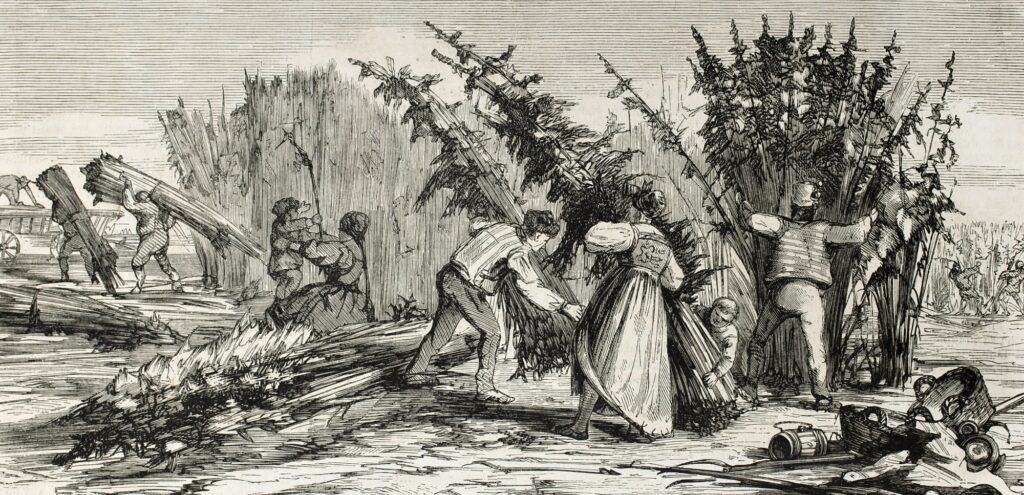Hemp plants have been cultivated for thousands of years and have played a major role in human history. But when was hemp first used, what was it used for, and when did it first come to the United States of America?
What Is The History Of The Hemp Plant?
Archaeological evidence discovered on the Oki Islands near Japan suggests that settlers were utilizing hemp over 10,000 years ago, around 5,000 years before the first pyramids in Egypt, and over 3,500 years before the birth of the Sumerian empire.
More evidence of early hemp use was discovered in China and dated to around 5,000 BC. The Chinese used the crop to make textiles and ropes. Several thousands of years later, Greek historians wrote of Scythian tribes that would inhale parts of the hemp plant for ritual and recreation.
It is also thought to have been used by the Egyptians, Hittites, Greeks, and Romans.
Throughout much of this time, hemp was valued mainly as a fiber crop but also used as food, oil, and medicine.
When Was The Hemp Plant Discovered?
Hemp fiber doesn’t last forever and our Neolithic ancestors weren’t exactly meticulous when it came to record-keeping (mainly because they had no written language and nothing to write on), so it’s hard to pinpoint when hemp was first discovered. However, most experts agree that this happened long before the agricultural age, which means we were harvesting and utilizing wild hemp long before we thought to cultivate it.
Experts are not sure when humans first used hemp flowers for medicine, recreation, or ritualistic purposes, but there’s a good chance that this occurred around the same time that hemp was used for its fiber.
Our ancestors were closely connected to the natural world, and if a plant was providing them with fiber and making their lives easier, they likely experimented with its seeds, flowers, and oil, as well.
What is the Etymology of Hemp, Cannabis, and Marijuana?
As is often the case, there is a lot of debate concerning the etymology of these three words. Languages evolve over long periods of time and very rarely are these evolutions recorded. As a result, we’re often left with theories and educated guesses.
The word “cannabis” is a great example of this. Many believe that it comes from the Greek word “κάνναβις”, which was likely borrowed from either the Thracians in Southeast Europe or the Scythians in Central Asia and Eastern Europe.
From there, it may have passed into Latin, Slavic, and German, experiencing minor sound shifts before assuming its modern form.
However, others argue that it comes from an Assyrian word that was used to refer to a source of fiber, medicine, and oil, and sounds like “cannabis”.
Interesting, it’s believed that “hemp” also stems from the Greek “κάνναβις”, with the “k” switching to “h” via Proto-German, and then becoming “hanap” and eventually “hemp”.
As for “marijuana”, it originated in Mexican Spanish and may have come from an old Aztec word or a Chinese phrase. In reality, the exact origins have been lost to history, but it’s worth noting that while “marijuana” is commonly used in North America, it’s rare to hear this term in Europe or Asia, where “cannabis” is more common.
When Was Hemp First Used In America?
Spanish colonization brought the hemp plant to North America in the middle of the 16th century. A few decades later, early settlers in Virginia recorded that hemp was one of the crops being cultivated by the natives.
Hemp farming became commonplace over the next century and it was used in the production of paper, rope, clothing, and other hemp products.
Early drafts of the Declaration of Independence were written on hemp paper and George Washington was a big fan of the crop.
America’s first president encouraged the cultivation of industrial hemp throughout the country, believing that it could prove to be a valuable cash crop. He even grew his own plants and chronicled his efforts in his diary.
Thomas Jefferson, James Madison, Andrew Jackson, and James Monroe also farmed hemp and used it for a variety of purposes.
Hemp cultivation continued throughout the 19th and early 20th centuries. Abraham Lincoln used hemp seed oil to fuel the lamps in his house and the United States Department of Agriculture (USDA) even declared that an acre of hemp produced 4x more paper than an acre of trees.
Attitudes changed in the run-up to World War II, though.
In 1937, the Marijuana Tax Act levied a tax on cannabis and hemp sales and this led to a significant decrease in production.
Efforts were made to increase production in later years, including the “Hemp For Victory” campaign in 1957 which they hoped would aid the war effort, but the final blow came in 1970 when the Controlled Substances Act classified hemp as an illegal drug.
The restrictions meant that industrial hemp was treated the same as recreational marijuana.
Hemp seed and hemp seed oil imports increased during the late 1990s and hemp extracts found their way into many bath and body care products. In 2007, hemp licenses were granted to two hemp farmers in North Dakota. 7 years later, an act was signed to legalize agricultural pilot programs.
Hemp’s journey was completed in 2018 when the Agricultural Improvement of 2018 (also known as the “Farm Bill”) was signed and hemp was removed from the Controlled Substances Act.
Why Did America Stop Growing Hemp?
Hemp production rapidly decreased in the middle of the 20th century when many farmers turned to other crops due to the Marijuana Tax Act.
Hemp fiber was incredibly useful and the crop could also be used to produce food, oil, and medicine, but it simply wasn’t as profitable for American farmers and so they turned to other crops. The availability of synthetic fibers also decreased the need for hemp and drove the profitability down further.
By the time hemp was illegalized, it was already deemed unsuitable for American farmers.

